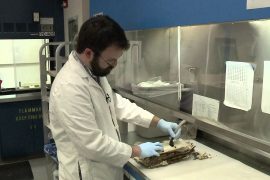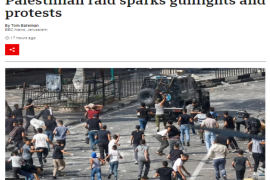On March 11th the BBC News website published a report headlined “Palestinian teenager killed in West Bank clash”. BBC audiences were told that:
“A Palestinian teenager has reportedly been shot dead by Israeli forces during a clash in the occupied West Bank.
Palestinian medics said Mohammed Hamayel, 15, was hit in the face by live ammunition near the village of Beita, south of the city of Nablus.
Israel’s military said 500 Palestinians took part in what it called a violent riot, hurling rocks towards its troops and setting tyres on fire.”
Apparently the BBC is not convinced that 500 people throwing rocks and petrol bombs is a violent riot and so found it necessary to qualify that description. No such qualification was seen however concerning the claim of the use of “live ammunition”. AP reported that witnesses stated that the IDF had used rubber coated bullets and in response to an enquiry from CAMERA, IDF spokesman Jonathan Conricus confirmed that the army used only rubber bullets.
The BBC’s account of the background to the story is based entirely on Palestinian sources:
“The area has been the scene of growing tension in recent weeks.
Palestinians say a group of Jewish settlers has been trying to take control of a hill in the middle of several of their villages.
A witness told the BBC that Palestinians had gathered on Wednesday following rumours the settlers were heading to the hill.
When Israeli forces arrived Palestinians threw stones at them, and the soldiers fired live ammunition, rubber bullets and tear gas from drones, the witness said.
Palestinian health officials said a further 17 people were injured.
The settlers had reportedly been organising an archaeological tour of the hill, saying it hosted a site of Biblical significance.”
The actual background to the story was reported by Kan 11’s Gal Berger a week before the BBC’s report on the March 11th incident was published.
The hill is called Tel Aroma and it is located between the Palestinian village of Beita and the Israeli community of Itamar, south of Nablus/Schem. It is situated in Area B (i.e. the Palestinian Authority has civil control and Israel controls security) and is the site of a fortress dating from Hasmonean times (1st century BCE).
In late February a tour to the site was planned by a group of Israeli families. Palestinians – organised by the Nablus branch of Fatah – had previously erected a flagpole at the site and the night before the planned trip hundreds gathered on the hilltop in order to prevent it from taking place. The Palestinians rioted throughout the day and the trip was cancelled. Similar disturbances have continued since then and those acts of violence were praised by the PA president Mahmoud Abbas at a televised Fatah meeting on March 1st.
“What I saw in Nablus was great. This was the right thing to do. They need to understand that we are fighting with our eyes, our hands, our legs, and with everything, and that we will not allow them to toy with us. We are teaching them lessons. When they see unarmed people, people who have no weapons… Women and children chase [the Israelis] who run away from them… It makes me happy to see this. Really. This is our way to accomplish what we want. This is our way to accomplish what we want. By means of peaceful resistance, and with these efforts… The sisters should be in front at the protests. This is the most important thing. Seeing the girls beating up a policeman or a soldier really fills my heart with joy. This is how we want our peaceful popular resistance to be. This is our way to vanquish our enemies, and to achieve our independent state with Jerusalem as its capital.”
Abbas’ blatant incitement and the fact that the rioting at Tel Aroma is organised by the Nablus branch of Fatah naturally did not make it into the BBC’s report. Unverified allegations from PA officials concerning “settlers…trying to take control” of the hill of course did.
Predictably, the final part of the BBC’s report included amplification of the BBC’s standard partial mantra on ‘settlements’ and ‘international law’ along with exclusive promotion of the Palestinian narrative.
“About 600,000 Jews live in about 140 settlements built since Israel’s occupation of the West Bank and East Jerusalem in 1967. The settlements are widely considered illegal under international law, though Israel has always disputed this.
Palestinians have long called for the removal of the settlements, arguing that their presence on land they claim for a future independent Palestinian state makes it almost impossible to make such a state a reality.”
As we see, the account provided by the BBC relies on and dovetails with the narrative promoted by PA and Fatah officials. So much for the corporation’s obligation to provide “accurate and impartial news”.




